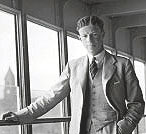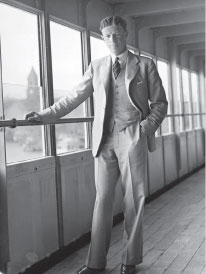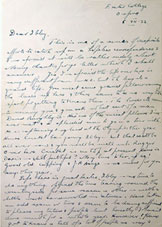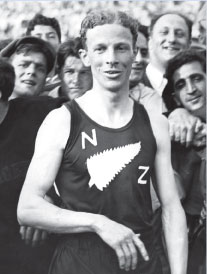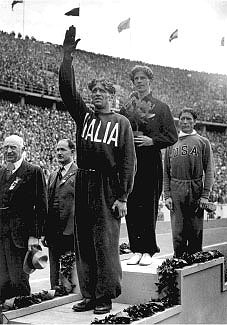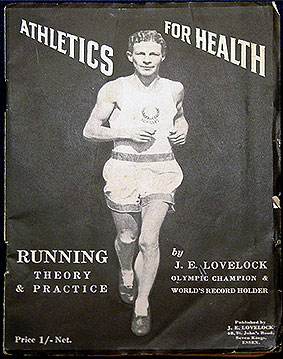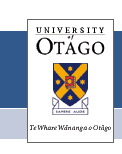

A National Library
Gallery Exhibition Supported by Rhodes House, Oxford
1931
Jack Lovelock | 1910 - 1949
Harry Amos, chairman of the New Zealand Olympic Committee in a letter to Arthur Porritt, 10 December 1932. Original letter held by the Olympic Museum, Wellington. Jack Lovelock is known to New Zealanders as the athlete who won New Zealand’s first Olympic gold medal for athletics in 1936. Less well known is the role the Rhodes scholarship played in his development. Lovelock started to develop into a dedicated athlete as a student at Timaru Boys’ High. He continued running during his medical studies at Otago University, and his athletic ability helped him to win a Rhodes scholarship. But when he left New Zealand for Oxford, Lovelock had never won a national title. Oxford had an immediate impact on Lovelock’s running. He became a member of the exclusive Achilles club (open only to athletes from Oxford and Cambridge), which dominated British athletics at the time. In 1932, under the instruction of the Club coach, Bill Thomas, and in the company of some of the best middle-distance runners in the world, Lovelock broke the British mile record. The following year he broke the world record in America. He was now an international sports star and huge crowds watched his races against the leading British, European and American runners. At Oxford Lovelock also became good friends with Arthur Porritt, an earlier New Zealand Rhodes scholar and Olympic medallist, who was working in Britain as a surgeon. According to Porritt it was he who advised Lovelock to run the 1500 metres, instead of the 5000 metres at the Berlin Olympics in 1936.
‘Jack was a great worrier. He ran on nervous energy. Physically he was very fit, but mentally he was very fragile, jumpy even … After the race in Berlin, Jack was absolutely delighted. I’d never seen him like that before and never again. He was human. He was overjoyed, and grateful. He said to me, “You made the right decision.”’ Lovelock had set a new world record and won New Zealand’s first Olympic gold medal in athletics. In his diary he wrote, ‘It was undoubtedly the most beautifully executed race of my career. A true climax to years of steady work, an artistic creation.’ After his Olympic victory he retired from running and completed his medical training. He married and moved to New York where he died when he fell under a subway train. ‘Yes, I’m afraid the life over here is very different from N.Z. but oh boy it’s a grand life.’ So wrote Jack Lovelock, who seemed to enjoy the life of a student at Oxford. However, uppermost in his mind is his training and his comment to ‘Ibby’ is significant in light of his future achievements: ‘The next job is the Olympics – only hope I can strike form for I’d like to give it a real go & not make a fool of myself.’
Harold Abrahams, the BBC commentator, broke every broadcasting rule in the book when he relayed Jack Lovelock’s record breaking win in the 1500 final at the Berlin Olympics on 6 August 1936: ‘My God, he’s done it! Jack! Come on!’ and ‘Lovelock wins! Five yards, six yards. He wins! He’s won! Hooray!’ J.E. Lovelock (1910-49) was an Otago graduate, a Rhodes scholar (Exeter College, 1930), a medical doctor, and an Olympic champion. Indeed, his was New Zealand’s first Olympic gold medal in athletics.
In developing his own training programme, Lovelock used photography to perfect his fluid running style. This fine copy of Athletics for Health contains actual photographs of Lovelock running and the athletic principles he thought were necessary for all track and field events.
|
Special Collections |
1st Floor, Central Library, University of Otago |
20 September - 10 December 2004 |














